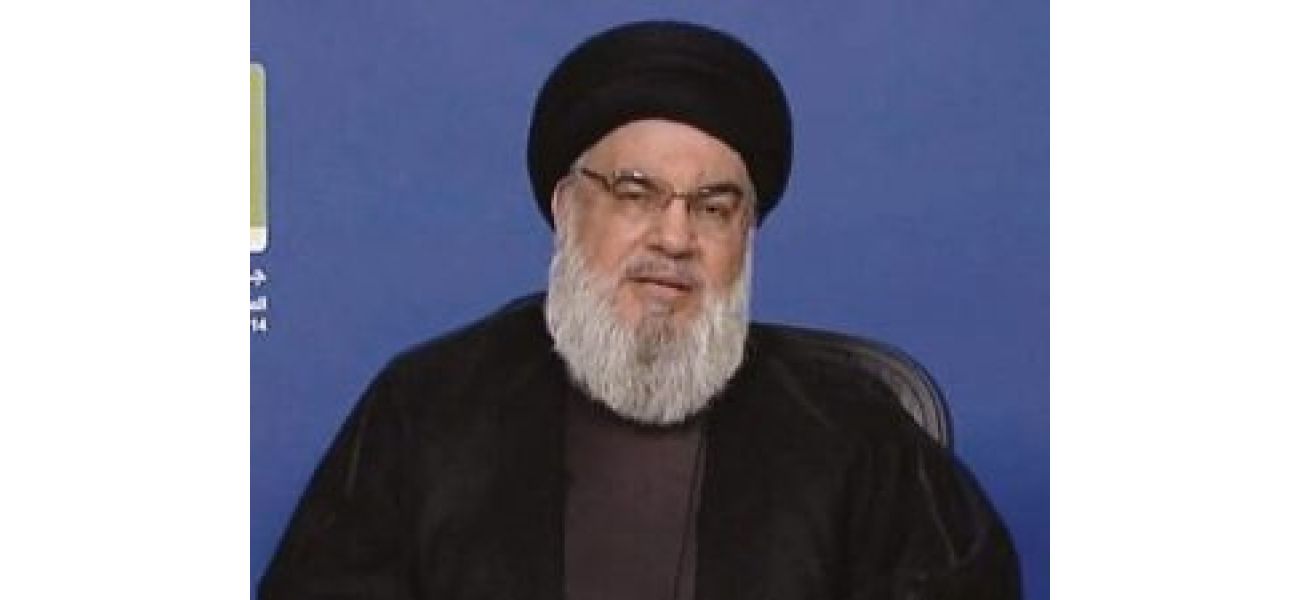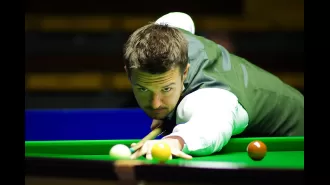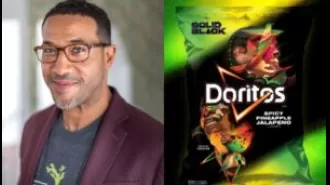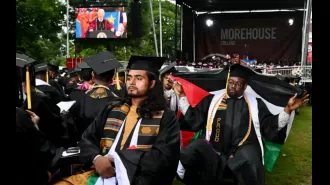Hezbollah leader Hassan Nasrallah killed by Israeli airstrike, confirms the group.
Hezbollah confirms leader Hassan Nasrallah killed in Israeli airstrike in Beirut. Hezbollah vows to continue holy war against enemy and for Palestine.
September 28th 2024.

In a tragic turn of events, Beirut was rocked by news of the death of Hassan Nasrallah, the leader and co-founder of Lebanon's Hezbollah group. A statement released by the group confirmed that Nasrallah had been killed in an Israeli airstrike the previous day. The loss of their leader was a devastating blow, and the statement mournfully declared that he had now joined his fellow martyrs. However, despite this loss, Hezbollah remained steadfast in their determination to continue their fight against their enemies and in support of Palestine.
Nasrallah, who had been at the helm of Hezbollah for over thirty years, was by far the most powerful target to be killed by Israel in the recent weeks of intensified fighting between the two sides. The Israeli military claimed that they had carried out a precise airstrike on Friday, targeting Hezbollah's leadership who were meeting at their headquarters in Dahiyeh, in the southern part of Beirut. Unfortunately, the strike resulted in the death of six people and injured 91 others. Among the casualties were Ali Karki, the commander of Hezbollah's Southern Front, and other high-ranking commanders, according to the Israeli military.
Iran also announced that one of its prominent generals, Abbas Nilforushan, was killed in the same airstrike. The 58-year-old general, who had been sanctioned by the US, died on Friday while carrying out his role as the deputy commander for operations in the Revolutionary Guard, as reported by Iran's state-run IRNA news agency.
The Israeli military defended their actions, stating that the airstrike was based on years of tracking Nasrallah and that they had access to real-time information that made the strike necessary. However, they refused to provide any details on the specific munitions used or the number of civilian casualties. The military spokesperson emphasized that Israel always takes measures to avoid civilian deaths and carries out strikes with the approval of intelligence and legal experts.
The news of Nasrallah's death was met with grief and anger by his supporters, who immediately began firing shots in the air in various parts of the country to mourn their leader. Some even protested, blaming Nasrallah's death on his support for the ongoing war in Gaza. The militant group Hamas, a close ally of Hezbollah, expressed their condolences and praised Nasrallah's efforts in supporting the Palestinian cause. They also vowed to continue the resistance against Israel, stating that assassinations would only strengthen their resolve.
Despite Nasrallah's death, Israel made it clear that their attacks on Hezbollah would not stop. The Chief of Staff, Lt. Gen. Herzi Halevi, stated that this was not the end of their actions and that more strikes were planned. Defense Minister Yoav Gallant also echoed this sentiment, calling the strike the most significant targeted attack in the history of Israel. The country has been on high alert, with thousands of its citizens evacuated from their homes near the border with Lebanon. The military has also mobilized additional reserve soldiers and updated guidelines for its citizens, limiting gatherings to no more than 1,000 people.
While Israel has inflicted significant damage on Hezbollah's capabilities, they admit that much of the group's arsenal remains intact. They remain determined to continue targeting the group until they stop their attacks, which have displaced tens of thousands of Israelis and over 200,000 Lebanese in the past week alone. As the tensions between the two sides escalate, both Israel and Hezbollah are preparing for a possible ground invasion.
In the midst of this ongoing conflict, Iran and Iraq have called for support for Hezbollah. The loss of Nasrallah, a revered figure in the region, has only strengthened the resolve of those who support the group's cause. It remains to be seen how these developments will impact the already volatile situation in the Middle East.
The news of the death of Hezbollah's leader and co-founder, Hassan Nasrallah, spread like wildfire on Saturday in Beirut. An official statement from the group confirmed the tragic event and expressed their grief for the loss of their beloved leader, who they say has now joined his fellow martyrs. In the same statement, they also declared their determination to continue their holy war against their enemy and to support Palestine.
Nasrallah, who had been at the helm of Hezbollah for over three decades, was by far the most powerful target to be killed by Israel in the recent weeks of intense fighting between the two sides. The Israeli military claimed that they had carried out a precise airstrike on Friday, targeting Hezbollah's headquarters in Dahiyeh, a southern suburb of Beirut, where the leadership was holding a meeting.
According to reports from the Lebanese Health Ministry, the strike resulted in the death of six people and injuries to 91 others. The Israeli military also confirmed the deaths of other high-ranking Hezbollah commanders, including Ali Karki, the commander of Hezbollah's Southern Front. However, the strike also resulted in the death of a prominent general from Iran's Revolutionary Guard, who was sanctioned by the US.
Lt. Col. Nadav Shoshani, an army spokesperson, defended the airstrike, stating that it was based on years of tracking Nasrallah and real-time information that made it possible. When pressed for more details, he declined to provide any information on the type of weapons used in the strike or the estimated number of civilian casualties. However, he did mention that Israel takes all necessary measures to avoid civilian casualties and always consults with intelligence and legal experts before carrying out any strikes.
In the wake of Nasrallah's death, the Palestinian militant group Hamas, an ally of Hezbollah, issued a statement expressing their condolences. They also affirmed their commitment to continue supporting the resistance against Israel, stating that history has shown that the loss of leaders only strengthens the determination of the resistance to carry on the fight. They also condemned the assassinations and stated that it would only reinforce their resolve to fight for the liberation of Lebanon and Palestine.
The news of Nasrallah's death was met with mixed reactions in Lebanon, with some people mourning his death and others protesting that he was killed because of his support for the war in Gaza. In some areas, people were seen firing guns in the air as a sign of mourning. Meanwhile, Israeli officials made it clear that this was not the end of their actions against Hezbollah and that they would continue to apply pressure until they stopped their attacks, which have displaced thousands of people on both sides of the border.
The Israeli military has already mobilized additional reserve soldiers and sent two brigades to the northern border for training in case of a possible ground invasion. They have also updated guidelines for Israeli citizens, canceling gatherings of more than 1,000 people due to the ongoing threat. The Israeli government has also declared that halting Hezbollah's attacks in the north is a priority and a war goal.
As tensions escalate between the two countries, both Iran and Iraq have called for support for Hezbollah. However, the Israeli military remains determined to weaken the group's capabilities and continue their targeted strikes. Despite the damage inflicted on Hezbollah's arsenal, they still pose a significant threat, and Israel will not rest until they are neutralized.
Nasrallah, who had been at the helm of Hezbollah for over thirty years, was by far the most powerful target to be killed by Israel in the recent weeks of intensified fighting between the two sides. The Israeli military claimed that they had carried out a precise airstrike on Friday, targeting Hezbollah's leadership who were meeting at their headquarters in Dahiyeh, in the southern part of Beirut. Unfortunately, the strike resulted in the death of six people and injured 91 others. Among the casualties were Ali Karki, the commander of Hezbollah's Southern Front, and other high-ranking commanders, according to the Israeli military.
Iran also announced that one of its prominent generals, Abbas Nilforushan, was killed in the same airstrike. The 58-year-old general, who had been sanctioned by the US, died on Friday while carrying out his role as the deputy commander for operations in the Revolutionary Guard, as reported by Iran's state-run IRNA news agency.
The Israeli military defended their actions, stating that the airstrike was based on years of tracking Nasrallah and that they had access to real-time information that made the strike necessary. However, they refused to provide any details on the specific munitions used or the number of civilian casualties. The military spokesperson emphasized that Israel always takes measures to avoid civilian deaths and carries out strikes with the approval of intelligence and legal experts.
The news of Nasrallah's death was met with grief and anger by his supporters, who immediately began firing shots in the air in various parts of the country to mourn their leader. Some even protested, blaming Nasrallah's death on his support for the ongoing war in Gaza. The militant group Hamas, a close ally of Hezbollah, expressed their condolences and praised Nasrallah's efforts in supporting the Palestinian cause. They also vowed to continue the resistance against Israel, stating that assassinations would only strengthen their resolve.
Despite Nasrallah's death, Israel made it clear that their attacks on Hezbollah would not stop. The Chief of Staff, Lt. Gen. Herzi Halevi, stated that this was not the end of their actions and that more strikes were planned. Defense Minister Yoav Gallant also echoed this sentiment, calling the strike the most significant targeted attack in the history of Israel. The country has been on high alert, with thousands of its citizens evacuated from their homes near the border with Lebanon. The military has also mobilized additional reserve soldiers and updated guidelines for its citizens, limiting gatherings to no more than 1,000 people.
While Israel has inflicted significant damage on Hezbollah's capabilities, they admit that much of the group's arsenal remains intact. They remain determined to continue targeting the group until they stop their attacks, which have displaced tens of thousands of Israelis and over 200,000 Lebanese in the past week alone. As the tensions between the two sides escalate, both Israel and Hezbollah are preparing for a possible ground invasion.
In the midst of this ongoing conflict, Iran and Iraq have called for support for Hezbollah. The loss of Nasrallah, a revered figure in the region, has only strengthened the resolve of those who support the group's cause. It remains to be seen how these developments will impact the already volatile situation in the Middle East.
The news of the death of Hezbollah's leader and co-founder, Hassan Nasrallah, spread like wildfire on Saturday in Beirut. An official statement from the group confirmed the tragic event and expressed their grief for the loss of their beloved leader, who they say has now joined his fellow martyrs. In the same statement, they also declared their determination to continue their holy war against their enemy and to support Palestine.
Nasrallah, who had been at the helm of Hezbollah for over three decades, was by far the most powerful target to be killed by Israel in the recent weeks of intense fighting between the two sides. The Israeli military claimed that they had carried out a precise airstrike on Friday, targeting Hezbollah's headquarters in Dahiyeh, a southern suburb of Beirut, where the leadership was holding a meeting.
According to reports from the Lebanese Health Ministry, the strike resulted in the death of six people and injuries to 91 others. The Israeli military also confirmed the deaths of other high-ranking Hezbollah commanders, including Ali Karki, the commander of Hezbollah's Southern Front. However, the strike also resulted in the death of a prominent general from Iran's Revolutionary Guard, who was sanctioned by the US.
Lt. Col. Nadav Shoshani, an army spokesperson, defended the airstrike, stating that it was based on years of tracking Nasrallah and real-time information that made it possible. When pressed for more details, he declined to provide any information on the type of weapons used in the strike or the estimated number of civilian casualties. However, he did mention that Israel takes all necessary measures to avoid civilian casualties and always consults with intelligence and legal experts before carrying out any strikes.
In the wake of Nasrallah's death, the Palestinian militant group Hamas, an ally of Hezbollah, issued a statement expressing their condolences. They also affirmed their commitment to continue supporting the resistance against Israel, stating that history has shown that the loss of leaders only strengthens the determination of the resistance to carry on the fight. They also condemned the assassinations and stated that it would only reinforce their resolve to fight for the liberation of Lebanon and Palestine.
The news of Nasrallah's death was met with mixed reactions in Lebanon, with some people mourning his death and others protesting that he was killed because of his support for the war in Gaza. In some areas, people were seen firing guns in the air as a sign of mourning. Meanwhile, Israeli officials made it clear that this was not the end of their actions against Hezbollah and that they would continue to apply pressure until they stopped their attacks, which have displaced thousands of people on both sides of the border.
The Israeli military has already mobilized additional reserve soldiers and sent two brigades to the northern border for training in case of a possible ground invasion. They have also updated guidelines for Israeli citizens, canceling gatherings of more than 1,000 people due to the ongoing threat. The Israeli government has also declared that halting Hezbollah's attacks in the north is a priority and a war goal.
As tensions escalate between the two countries, both Iran and Iraq have called for support for Hezbollah. However, the Israeli military remains determined to weaken the group's capabilities and continue their targeted strikes. Despite the damage inflicted on Hezbollah's arsenal, they still pose a significant threat, and Israel will not rest until they are neutralized.
[This article has been trending online recently and has been generated with AI. Your feed is customized.]
[Generative AI is experimental.]
0
0
Submit Comment





